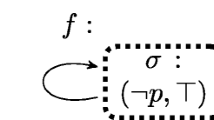Abstract
The π-calculus process algebra describes the interaction of concurrent and communicating processes. The π-calculus, however, has neither explicit agency nor epistemic capabilities. In this paper, we present the formal syntax and semantics of a multi-agent dynamic epistemic logic. In this logic, the epistemic actions of agents are π-calculus processes. A process of the language is translated to a class of model updating functions reflecting the epistemic changes after the execution of such processes. Our proposal combines the capabilities of two approaches: it is possible to model structured interaction among agents as elaborated π-calculus programs, and it is also possible to describe the dynamic knowledge implications of such programs. We show the utility of our language by encoding the Dining Cryptographers protocol.
Access this chapter
Tax calculation will be finalised at checkout
Purchases are for personal use only
Preview
Unable to display preview. Download preview PDF.
Similar content being viewed by others
References
Baltag, A., Moss, L.S., Solecki, S.: The logic of public announcements, common knowledge, and private suspicions. Technical Report SEN-R9922, CWI (1999)
Chadha, R., Delaune, S., Kremer, S.: Epistemic logic for the applied pi calculus. In: Lee, D., Lopes, A., Poetzsch-Heffter, A. (eds.) FMOODS 2009. LNCS, vol. 5522, pp. 182–197. Springer, Heidelberg (2009)
Chaum, D.: The dining cryptographers problem: unconditional sender and recipient untraceability. J. Cryptol. 1(1), 65–75 (1988)
van Ditmarsch, H., var der Hoek, W., Kooi, B.: Dynamic Epistemic Logic. Springer, Heidelberg (2007)
Harel, D., Kozen, D., Tiuryn, J.: Dynamic Logic. MIT Press, Cambridge (2000)
Mardare, R.: Observing distributed computation. a dynamic-epistemic approach. In: Mossakowski, T., Montanari, U., Haveraaen, M. (eds.) CALCO 2007. LNCS, vol. 4624, pp. 379–393. Springer, Heidelberg (2007)
Milner, R., Parrow, J., Walker, D.: Modal logics for mobile processes. Theoretical Computer Science 114(1), 149–171 (1993)
Phillips, A., Cardelli, L.: A correct abstract machine for the stochastic pi-calculus. In: Concurrent Models in Molecular Biology (Bioconcur 2004), London (2004)
Plaza, J.A.: Logics of public communications. In: Proceedings of the 4th International Symposium on Methodologies for Intelligent Systems, pp. 201–216 (1989)
Sangiorgi, D., Walker, D.: The Pi-Calculus — A Theory of Mobile Processes. Cambridge University Press, Cambridge (2001)
Ufferman, E., Góngora, P.A., Hernández-Quiroz, F.: A complete proof system for a dynamic epistemic logic based upon finite π-calculus processes. In: Proceedings of Advances in Modal Logics 2010. College Publications (to appear 2010)
van Benthem, J., Gerbrandy, J., Hoshi, T., Pacuit, E.: Merging frameworks for interaction. Journal of Philosophical Logic 38(5), 491–526 (2009)
van Benthem, J., van Eijck, J., Kooi, B.: Logics of communication and change. Inf. Comput. (2005)
van Eijck, J., Orzan, S.: Epistemic verification of anonymity. Electron. Notes Theor. Comput. Sci. 168, 159–174 (2007)
Author information
Authors and Affiliations
Editor information
Editors and Affiliations
Rights and permissions
Copyright information
© 2010 Springer-Verlag Berlin Heidelberg
About this paper
Cite this paper
Góngora, P.A., Ufferman, E., Hernández-Quiroz, F. (2010). Formal Semantics of a Dynamic Epistemic Logic for Describing Knowledge Properties of π-Calculus Processes. In: Dix, J., Leite, J., Governatori, G., Jamroga, W. (eds) Computational Logic in Multi-Agent Systems. CLIMA 2010. Lecture Notes in Computer Science(), vol 6245. Springer, Berlin, Heidelberg. https://doi.org/10.1007/978-3-642-14977-1_8
Download citation
DOI: https://doi.org/10.1007/978-3-642-14977-1_8
Publisher Name: Springer, Berlin, Heidelberg
Print ISBN: 978-3-642-14976-4
Online ISBN: 978-3-642-14977-1
eBook Packages: Computer ScienceComputer Science (R0)



